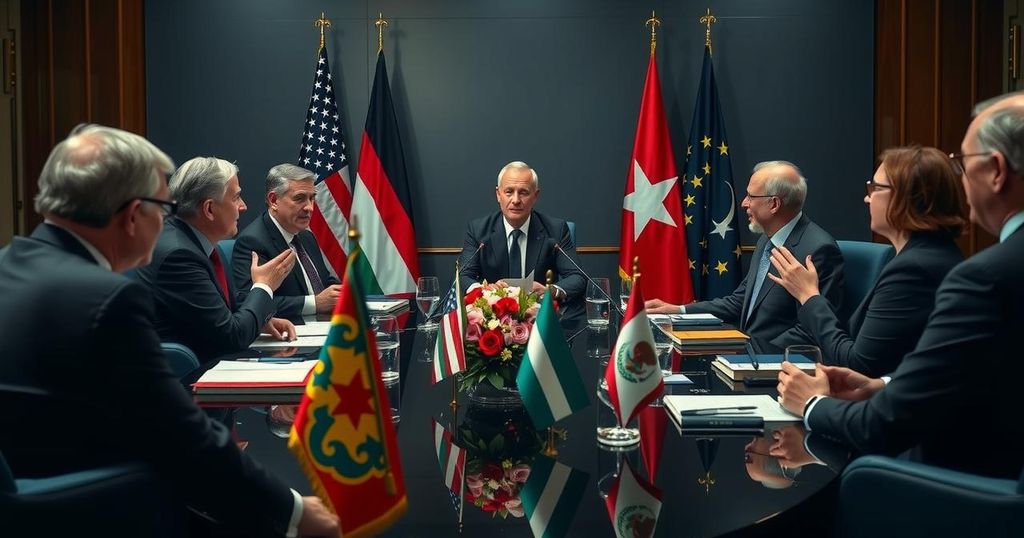G20 Leaders Urge Comprehensive Ceasefires Amid Global Challenges

The G20 leaders have called for comprehensive ceasefires in Gaza and Lebanon while addressing global issues such as poverty, climate change, and the taxation of the ultra-wealthy at their summit in Rio de Janeiro. Brazilian President Lula da Silva emphasized that hunger and poverty are political choices and launched an initiative supported by 81 nations to combat these challenges, amidst discussions on the humanitarian crises and climate financing.
The G20 summit recently convened in Rio de Janeiro, where leaders of the world’s major economies called for comprehensive ceasefires in Gaza and Lebanon. This gathering, attended by various heads of state, focused on critical issues such as political stability, poverty alleviation, climate change, and taxation of the ultra-wealthy. Brazilian President Luiz Inacio Lula da Silva particularly emphasized the geopolitical implications of poverty and hunger, asserting these issues are products of political choices rather than mere scarcity. During the summit, the leaders expressed serious concern regarding the humanitarian crisis in Gaza and the escalating tensions in Lebanon, advocating for immediate ceasefires aimed at restoring safety for civilians on both sides of the border. The summit, however, did not address Russian aggression explicitly; instead, it welcomed constructive efforts toward achieving a durable peace in Ukraine while acknowledging the absence of Russian President Vladimir Putin. Lula’s agenda included launching a global initiative to tackle extreme poverty and hunger, noting that these crises could be mitigated through political will and cooperation among nations. The initiative gained support from 81 countries, which underscored the collaborative ambition to eradicate hunger. Despite the discussions surrounding climate change, there were no significant advancements in this area, as the G20 merely recognized the need for increased climate financing without committing to concrete figures or accountable parties. Overall, the summit collectively emphasized the necessity of fostering dialogue and cooperation on pressing global issues, while also underscoring the urgent need to address humanitarian crises in conflict zones.
The G20 summit provides a platform for leaders from the world’s 20 largest economies to discuss and strategize on global economic issues, international trade, and financial markets. This year’s summit, held in Brazil, was particularly significant as it gathered attention around ongoing conflicts such as those in Gaza and Lebanon. Given the current geopolitical climate, including the war in Ukraine and the socio-economic impacts of climate change, G20 discussions aim to foster cooperation in creating solutions that tackle poverty, hunger, and environmental sustainability.
In conclusion, the G20 summit in Rio de Janeiro highlighted the urgent need for comprehensive ceasefires in Gaza and Lebanon amid a backdrop of various global crises, including poverty and climate change. The leaders recognized the intertwined nature of political decision-making and societal challenges, advocating for increased collaboration to achieve meaningful solutions. This summit marked a pivotal moment for addressing humanitarian needs and reinforcing commitments to sustainable development and peace.
Original Source: www.aljazeera.com







